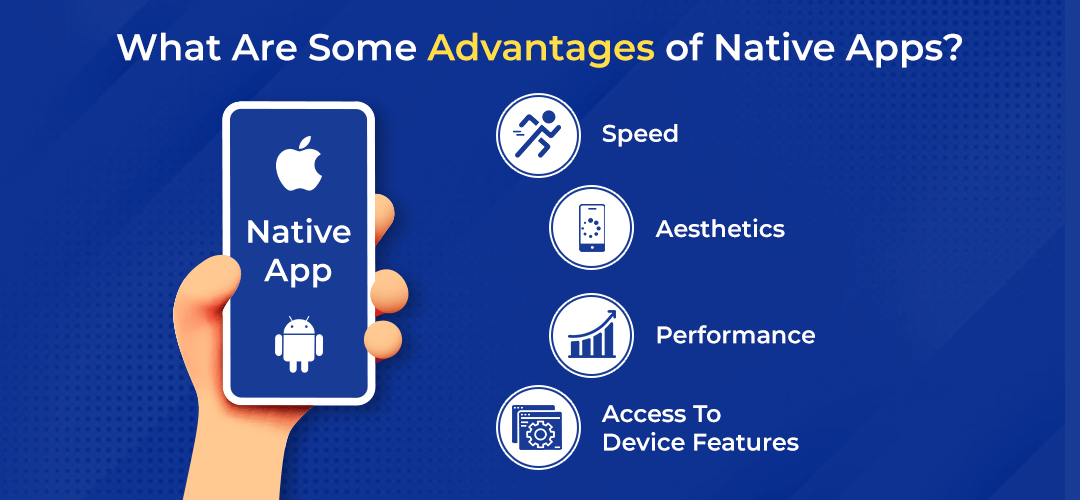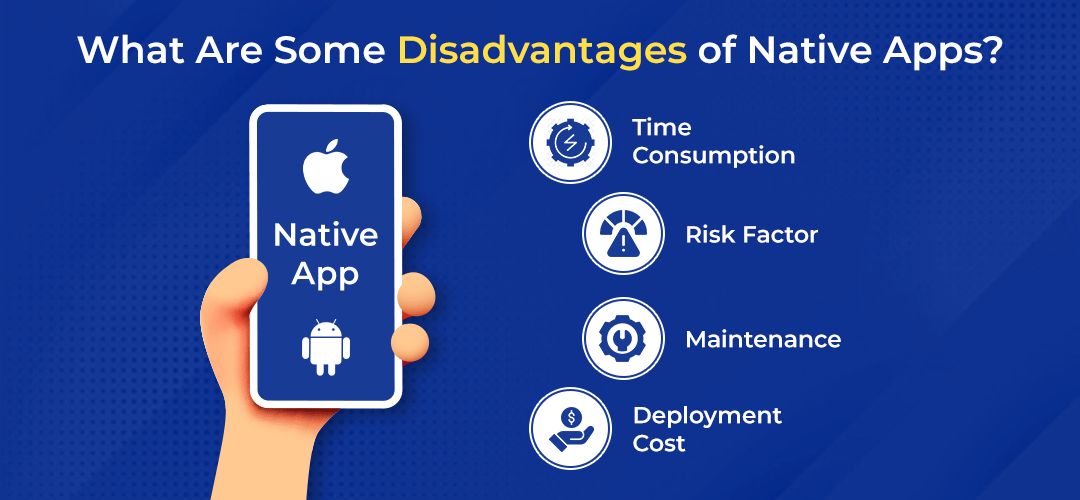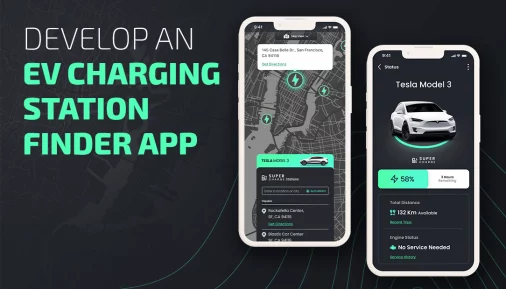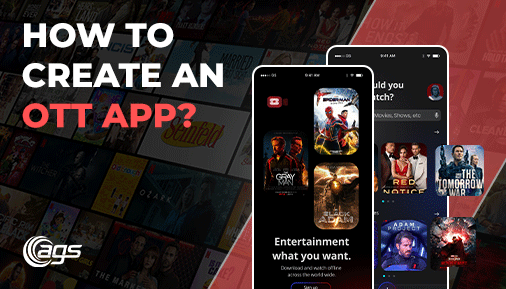With the rise of mobile apps and responsive web design (a significant factor in Google’s recent ranking changes), it’s now more important than ever to know the differences between native, hybrid, and cross-platform technologies. Suppose you’re building an app that needs to be fast and has a beautiful UI. In that case, a native solution will work for you — but if your business relies on low cost or high scalability across multiple platforms, compatibility with various devices may be necessary. The main thing is to identify what your goals are with your project and match them up with the right tool!
Businesses struggle to decide which platforms to use in this day and age.
According to the Marry Meeker survey, “mobile internet (apps) are rising while desktop internet usage continues to fall.”
As per the recent report by Low Code Explosion, “Approx. 74% of the top 50 retail apps are hybrid apps.”
We’ve put together a resource to help businesses understand the pros & cons of all the major development solutions, including in-depth explanations of what sets them apart.
Whether you’re building a high-end app or planning an enterprise website, this guide will help you pick the right technology and save you time and money in the long run!
Let’s get started!
What is a Native App?
 A native app is an app that has been written specifically for a particular device and operating system. All the tools required to create a native app are included by default on the device’s operating system, so there’s no need to develop any additional software or customize a mobile browser to build a native application.
A native app is an app that has been written specifically for a particular device and operating system. All the tools required to create a native app are included by default on the device’s operating system, so there’s no need to develop any additional software or customize a mobile browser to build a native application.
What are some advantages of Native Apps?
 Speed: Since it has not been converted or ported over to an entirely new environment, a native app will run faster than cross-platform apps.
Speed: Since it has not been converted or ported over to an entirely new environment, a native app will run faster than cross-platform apps.
Aesthetics: There won’t be any long delays while the app loads, and it won’t appear pixelated or blurry on your screen like with some cross-platforms. If you have a strict design aesthetic, you should consider building a native app.
 Performance: Typically, native apps will have a higher performance than cross-platforms because they are more specialized. A native app will only run on the device it was developed for and can access hardware resources that may not be available elsewhere.
Performance: Typically, native apps will have a higher performance than cross-platforms because they are more specialized. A native app will only run on the device it was developed for and can access hardware resources that may not be available elsewhere.
Access to device features: Native apps can take advantage of certain features that third-party apps cannot, such as an accelerometer or the camera on your phone or tablet.
What are some disadvantages of Native Apps?
 Time Consumption: The main drawback of Native apps is the time-consuming process. Many times app owners want to create an android app, but later on, they decide to make it for a different operating system. So, you will have to consider your requirement before creating native apps. Also, native apps take more development time.
Time Consumption: The main drawback of Native apps is the time-consuming process. Many times app owners want to create an android app, but later on, they decide to make it for a different operating system. So, you will have to consider your requirement before creating native apps. Also, native apps take more development time.
Risk Factor: As we have mentioned the time consumption is due to different OS development purposes, and there is a risk factor of success rate. As per the experts, most of the native apps are failed because of their OS limitations.
Maintenance: They’re expensive to develop, which makes them hard to maintain across multiple versions of their operating system or hardware.
Deployment Cost: They often require an app store, making them more expensive to maintain. App stores want developers to pay a fee for listing in the store and then take a portion of sales if the app is purchased through their website. It can lead to higher consumer prices and reduced developer profit margins.
What is a Hybrid App?
 Hybrid applications are built using a combination of web technologies and native code. These applications are usually available through an app store but can also be accessed via a website.
Hybrid applications are built using a combination of web technologies and native code. These applications are usually available through an app store but can also be accessed via a website.
Hybrid apps are less expensive and quicker to develop than their native counterparts because they’re not coded for each platform individually. This means that the same app can run on multiple platforms without having to be redeveloped or ported. Instead, developers rely on the fact that all modern web browsers share many core technologies, particularly JavaScript and HTML5.
What are some advantages of Hybrid Apps?
 Faster Development: Hybrid apps run without any modification on different devices, such as mobile and desktop, and take lesser time to build but don’t require much more time to update. This means that hybrid apps are easier to develop, maintain and update.
Faster Development: Hybrid apps run without any modification on different devices, such as mobile and desktop, and take lesser time to build but don’t require much more time to update. This means that hybrid apps are easier to develop, maintain and update.
Cross-Platform Support: Because of their cross-platform support, users will have no problem installing hybrid apps across multiple platforms and operating systems.
What are some disadvantages of Hybrid Apps?
 JavaScript: Hybrid apps still rely on JavaScript and HTML5, which means they can be slower than native applications and may not be as responsive to user input. Additionally, hybrid apps may not work on specific operating systems or browsers.
JavaScript: Hybrid apps still rely on JavaScript and HTML5, which means they can be slower than native applications and may not be as responsive to user input. Additionally, hybrid apps may not work on specific operating systems or browsers.
Scalability: Hybrid apps can also lose some functionality when run in a mobile browser, while native apps don’t suffer from this limitation. Additionally, because hybrid apps must use a mobile browser to display content and functionality, they may not look or perform the same in a mobile browser as on the device’s native operating system.
User Experience: As we already know that hybrid apps are designed for both mobile and desktop users, so there is a design limitation. You can’t create a better or smooth user experience compared to native apps because the same design should be responsive for desktop devices.
Maintenance Cost: Like their native counterparts, hybrid applications can be expensive and difficult to maintain because of the cost of maintaining a different programming language for each platform. This means you will need a higher budget to make it work.
Maintaining a hybrid app across multiple platforms can be expensive and time-consuming. Hybrid apps are often more challenging to maintain because they rely on technology that is not native to each device.
Since hybrid applications share many core technologies with their native counterparts, users may have trouble installing and running the application.
What is a Cross-Platform App?
 Cross-platform apps are designed for multiple operating systems and devices, regardless of the programming language used in their development. They’re built using web technologies that are common among all modern web browsers (HTML5, JavaScript, CSS3).
Cross-platform apps are designed for multiple operating systems and devices, regardless of the programming language used in their development. They’re built using web technologies that are common among all modern web browsers (HTML5, JavaScript, CSS3).
Cross-platform apps use web technologies and native code to create an app that can be run without the need for a web browser or the fact that it’s being converted into a new environment. This means there is no need to maintain multiple programming languages or build separate versions of the app for each platform.
What are some advantages of Cross-Platform Apps?
 Cross-platform apps are easy and inexpensive to develop. They can be built with less cost and time than their native counterparts.
Cross-platform apps are easy and inexpensive to develop. They can be built with less cost and time than their native counterparts.
Fast Development: Cross-platform apps developed by code reusability technology, which means developers can create code once and reuse the code for different OS apps. Code-reusability offers fast app development, it takes less time to build a cross-platform app.
Cross-Platform Support: Because of their cross-platform support, users will have no problem installing cross-platform apps across multiple platforms and operating systems.
Access to device features: Cross-platform apps can take advantage of certain features that third-party apps cannot, such as an accelerometer or the camera on your phone or tablet.
Easy To Maintain: As discussed, cross-platform apps take less time to develop because of code reusability, it also takes less time to debug and maintain the app due to single code.
On the other hand, some developers may not have the resources to develop web and native applications simultaneously. Or they believe that there are advantages to developing each platform separately. This is particularly true for games. In this case, it makes sense to consider building native applications rather than using a cross-platform app solution.
What are some disadvantages of Cross-Platform Apps?
 Responsiveness: Every operating system has its own functionality of graphics and responsiveness. Sometimes cross-platform apps cannot meet individuals’ OS requirements, which is why they lack responsiveness in cross-platform apps.
Responsiveness: Every operating system has its own functionality of graphics and responsiveness. Sometimes cross-platform apps cannot meet individuals’ OS requirements, which is why they lack responsiveness in cross-platform apps.
Functionality Issue: If a feature only works on one platform, you’ll have to consider making additional versions for the other platforms. It may take more time to build a particular feature for a different OS than native apps.
Slow Updates: The difficulty in maintaining cross-platform apps results in reduced customer confidence and potential lost revenue. This can be particularly true if the application continuously crashes or doesn’t run properly on multiple platforms or devices.
Performance Issue: Some web APIs (Application Programming Interface) provide access to device features without requiring a native app. For example, the iPhone 6’s camera and the Android OS’s phone capabilities don’t need native support to access them.
Which one to choose for your project?
Before investing in native or hybrid applications, it’s essential to understand the differences between the two and what they’ll cost you. If a cross-platform app is too complex or expensive to develop and maintain, you may want to focus on native apps instead.
 As you can see, building an app for different platforms has many advantages and disadvantages. Understanding how your app will be used is essential before deciding what’s best for your company and your users are significant. If you’re interested in building a mobile application that has the potential to reach a broad audience, you should consider developing native applications. Native applications are better suited for more complex tasks.
As you can see, building an app for different platforms has many advantages and disadvantages. Understanding how your app will be used is essential before deciding what’s best for your company and your users are significant. If you’re interested in building a mobile application that has the potential to reach a broad audience, you should consider developing native applications. Native applications are better suited for more complex tasks.
If your app is simple, has limited functionality, and doesn’t require using a camera or other advanced device capabilities, then you should build a cross-platform app. Cross-platform apps are much easier and faster to develop than their native or hybrid counterparts; however, they require maintenance.
How does Auxano Global Services help you choose the right platform to build your app?
Are you looking for a reliable partner for your next mobile app project? Auxano Global Services has delivered more than 100 successful projects. From business apps to games, we build any type of mobile application that suits your goals and budget.
Auxano Global Services, a mobile app development company based in the UK, is here to ensure that your business translates its needs into a winning strategy and leads you toward the right bespoke mobile app development service.
By leveraging our industry expertise and end-to-end capabilities across consulting and development, we help clients transform their businesses through mobility solutions. Our experts assist you in planning, designing, coding, and testing your app, letting you focus on your core business instead of the technicalities.
Every project is unique. Our team will take into account the requirements of your business and translate them to mobile applications specific to your needs. After creation, our Mobile App development team will work closely with you to improve the quality of your product and extend its reach.
As per client requirements, we offer various solutions that can be customized according to industry standards and prevailing market trends. We also understand that a single company can’t create an app that appeals to an array of different audiences across dozens of devices. We help you decide on the right platform to address your business needs.
 Get started today! If you’re looking to create the next big thing or would like assistance with your current project, please submit our contact form, and we will be in touch.
Get started today! If you’re looking to create the next big thing or would like assistance with your current project, please submit our contact form, and we will be in touch.
After reading this article, you may want to check out the best prototyping tools for mobile apps to help you design, share and test your app idea. Also, check out our mobile app development services if you want to create a cross-platform app, native, or hybrid app for Android and iOS devices. We have successfully built hundreds of apps for clients from different industries across the globe.
The Final Verdict:
In order to successfully bring your business idea to the market, it is essential to consider the target audience and their needs. If you’re going to build a cross-platform app, then developing it with a cross-platform framework may be a good start. However, we suggest native, and top hybrid app development can be a good approach, depending on your app requirements and goals. Both these approaches have pros and cons, but they also have some features in common: they offer high quality, competitive prices, and excellent user experience. By working with a professional company with expertise in building apps for small businesses like yours, you can rest assured that your project will be completed on time and within budget.
Are you planning to have an app developed? What are your goals? What features do you think your app should have? Let us know in the comments below.
We look forward to your input!
Please contact us today if you need a mobile development team with around-the-clock availability. We’d love to hear from you!
Frequently Asked Questions
-
1. How to choose the right platform for app development?
Native, hybrid, and cross-platform apps all have their pros and cons. It is up to you to decide which ones fit your business needs best. It would be better to discuss your idea and requirement first, then, our app development experts can assist you in choosing the perfect app development platform.
-
2. What are the differences between native vs. cross-platform vs. hybrid apps?
Native apps are developed especially for particular devices or OS. If you have a targeting audience, that uses iOS most, then creating an iOS-based native app is beneficial. Cross-platform apps are used for multiple operating systems. Hybrid apps can perform as native apps as well as web apps.
-
3. Do I really need a mobile app?
Mobile apps are essential for businesses looking to grow beyond a local market. They offer a variety of benefits: instant access, increased traffic, increased time spent on-site and conversion rates, enhanced user experience, higher engagement rates, and native mobile ads integration to name just a few. Based on results from business owners who have tried cross-platform and native apps, a clear advantage of native apps is the ability to offer richer experiences, deeper engagement, and better conversions. That’s because seamless access to camera functionality and location services are only possible using a native app.
-
4. Why should I choose you?
We are a team of industry experts and creative developers who deliver quality results and competitive prices. Our app development process is streamlined to make the most of your time and budget. We start with a free consultation where you can outline your project needs, goals, and features. Based on these, we can decide on the best approach to develop your app. During the course of development, we keep you informed with regular updates and send you a demo when the project is ready for beta testing or launch. If you’re planning to have an app developed, you might be interested in mobile app marketing tips that can help promote your app after it’s launched.



![Complete Guide to Create Decentralized Apps (Dapps) [2023]](https://auxanoglobalservices.co.uk/new/wp-content/uploads/2023/03/Front-506x289.jpg)

